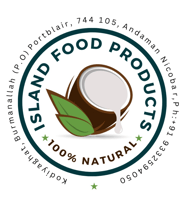Island Blog
Discover the advantages of using coconut oil in your culinary creations for enhanced flavor and health.
Coconut oil has gained immense popularity in recent years, thanks to its myriad benefits for health and wellness. This versatile oil is rich in medium-chain triglycerides (MCTs), which can boost metabolism and promote weight loss. Additionally, coconut oil is known for its antimicrobial properties, making it an excellent choice for improving skin health and fighting infections. Incorporating coconut oil into your daily routine can also enhance brain function, as the MCTs provide a quick source of energy for the brain. For those looking for high-quality coconut oil, check out https://islandfoods.in/shop, where you can find organic options that retain all the natural benefits. Furthermore, coconut oil can be used in cooking, baking, and even as a natural moisturizer, making it a truly multifunctional product. With its numerous advantages, it's no wonder that coconut oil has become a staple in many households worldwide.


Benefits of Coconut Oil
The Fascinating History of Pickles
Pickles are a beloved, tangy delight enjoyed by people all over the world. Whether served as a side dish, snack, or ingredient, pickles have a long and fascinating history that stretches back thousands of years. The process of pickling has played a vital role in preserving food, adding flavors, and offering a solution to food shortages across different cultures. Let’s take a deep dive into the rich history of pickles.
The Origins of Pickling
The word "pickle" comes from the Dutch word pekel, which refers to brine or a salty solution used for preserving food. The process of pickling, however, dates back over 4,000 years, making it one of the oldest methods of food preservation. The earliest known records of pickling can be traced to ancient Mesopotamia (modern-day Iraq), where cucumbers from India were first preserved in brine. This allowed people to store perishable food items for extended periods, especially during times of scarcity.
Pickles in Ancient Civilizations
Pickles spread from Mesopotamia to other parts of the world, and different cultures began to develop their own pickling traditions. In ancient Egypt, pickles were so popular that Cleopatra herself was said to consume them, believing they contributed to her legendary beauty. The Egyptians were adept at preserving cucumbers in brine, making them a staple of their diet.
In ancient Greece, pickles were considered both a food and a medicine. The famous Greek physician Hippocrates praised pickles for their health benefits, particularly for improving digestion. Similarly, in ancient Rome, pickles were common in the diet of soldiers, who carried them during long campaigns for their nutritious and refreshing qualities.
The Journey to Asia and Europe
Pickling techniques also spread to Asia, where it became an integral part of the diet in China, Korea, and Japan. In China, vegetables like cabbage and mustard greens were pickled in rice vinegar, salt, and spices. This gave rise to iconic dishes like paocai (pickled vegetables), which remain popular today.
In Korea, the tradition of making kimchi, a fermented vegetable dish often made with cabbage or radish, became a staple in Korean cuisine. The pickling process of kimchi involves using a mix of chili, garlic, and ginger, and it is left to ferment, resulting in a tangy, spicy delicacy.
In medieval Europe, pickling played a crucial role in sustaining populations through the harsh winters. Vegetables were often preserved in brine or vinegar to ensure food supplies during the colder months. By the 16th century, European explorers like Christopher Columbus and Amerigo Vespucci even brought pickles with them on their voyages to prevent scurvy among sailors.
Pickles in the Americas
Pickles crossed the Atlantic during the European colonization of the Americas, and soon, they became an integral part of the culinary culture in the New World. Cucumbers were introduced to North America, and pickling techniques were passed on to Native American communities.
One notable figure in American pickle history is Thomas Jefferson, the third president of the United States, who had a particular fondness for pickles and even grew cucumbers at Monticello, his Virginia estate. Pickles became a part of American food traditions, especially in regions with strong immigrant communities who brought their pickling practices with them, such as Jewish immigrants from Eastern Europe. These communities popularized dill pickles, which are now synonymous with American sandwiches and burgers.
Modern-Day Pickling
Today, pickles come in a wide variety of forms and flavors, from classic cucumber pickles to pickled onions, carrots, beets, and more. The methods of pickling have evolved, but the core process of preserving food in a vinegar or brine solution remains the same. Artisanal and gourmet pickles have become a growing trend, with people experimenting with different spices, herbs, and even fruit for unique flavor combinations.
Pickles are also a global phenomenon, with each culture putting its own spin on the concept. From achar in India to tsukemono in Japan and giardiniera in Italy, pickles continue to be an essential part of culinary traditions worldwide.
Health Benefits of Pickles
Aside from their zesty flavor, pickles offer various health benefits. Fermented pickles, like sauerkraut and kimchi, are rich in probiotics, which support gut health and improve digestion. Pickles are also a low-calorie food and are rich in vitamins, minerals, and antioxidants. However, it's important to consume them in moderation, as commercially available pickles can be high in sodium.
Conclusion
The history of pickles is as diverse and flavorful as the pickles themselves. From ancient Mesopotamia to modern-day kitchens, pickling has endured as a beloved method of food preservation. Whether you enjoy them for their tangy taste, health benefits, or simply as a side to your favorite meal, pickles remain an enduring culinary treasure with a rich legacy that continues to evolve.
Shop Tasty and Homemade Pickles of island pickles from www.islandfoods.in
